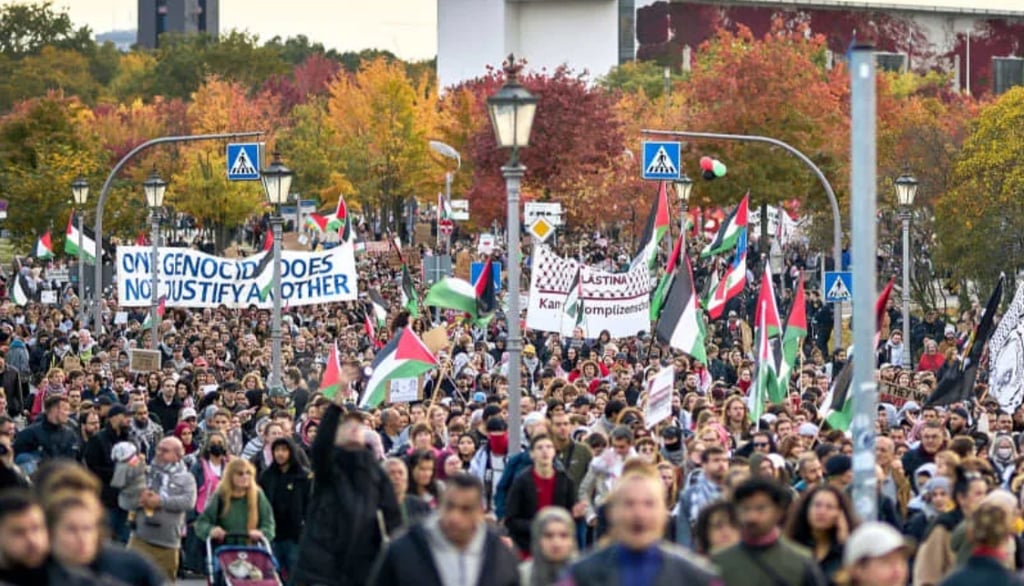Berlin’s Night of Solidarity: 14,000 March for Palestine Amid Controversy
10/12/20254 min read


Berlin’s Night of Solidarity: 14,000 March for Palestine Amid Controversy
Crowds marching through Berlin’s government district with Palestinian flags, illuminated by streetlights
On October 11, 2025, Berlin’s streets pulsed with the chants of thousands demanding justice for Palestine. But the night also sparked tensions, arrests, and questions about free expression.
On the evening of October 11, 2025, Berlin’s government district became a stage for one of the year’s most significant displays of solidarity. Approximately 14,000 people gathered for a pro-Palestinian rally, named “United for Gaza,” to demand an end to the ongoing conflict in Gaza and advocate for Palestinian rights. According to Berlin police, the crowd, which organizers estimated at closer to 16,000, marched peacefully for the most part, waving Palestinian flags and holding signs with messages like “Ceasefire Now” and “Justice for Palestine.” Yet, the night wasn’t without friction, as police reported 30 arrests tied to antisemitic symbols, legal violations, and minor clashes.
The rally unfolded against a backdrop of global unrest over the Gaza-Israel conflict, now in its third year. Starting at Platz des 18. März near the iconic Brandenburg Gate, the 3-kilometer march wove through Berlin’s historic core, drawing a diverse crowd—Palestinian diaspora, students, Jewish activists critical of Israel’s policies, and human rights advocates. The air buzzed with chants, music, and speeches calling for an immediate ceasefire, an end to Germany’s arms exports to Israel, and recognition of Palestinian statehood.
A City Divided by History
Berlin’s role as a hub for such protests is no accident. Germany’s complex history, particularly its post-Holocaust commitment to Israel’s security, shapes its response to the Israeli-Palestinian conflict. Pro-Palestinian demonstrations often face strict oversight, with authorities citing antisemitism risks to impose bans or restrictions. However, public sentiment is shifting. A 2025 YouGov poll found that 60% of Germans, including conservative voters, now view Israel’s actions in Gaza as disproportionate, fueling events like this one.
The march came days after the International Criminal Court issued new warrants for Israeli officials, intensifying calls for Germany to reconsider its €500 million in annual arms exports. Protesters, including voices from Amnesty International and Medico International, linked Gaza’s crisis to broader themes of global justice. “This isn’t just about Palestine—it’s about humanity,” said Nour, a 32-year-old marcher whose family fled Gaza. Social media captured the scene: keffiyehs waving, children holding signs, and a Jewish Voice for Peace group leading a moment of silence for all civilian victims.
Protest Highlights:
Turnout: 14,000 (police) to 16,000 (organizers)
Route: Brandenburg Gate to Reichstag area
Core Demands: Ceasefire, halt to arms sales, Palestinian statehood
Tensions and Arrests: The Night’s Darker Side
The rally’s message of unity was tested by moments of discord. Berlin police reported arresting 30 individuals for displaying “unconstitutional symbols” deemed antisemitic, violating association laws, or engaging in minor physical altercations. Some protesters reportedly held signs equating Zionism with Nazism, a trope condemned by Jewish organizations as inflammatory and misleading. Videos on X showed police detaining individuals amid heated exchanges, with one clip of an officer striking a protester sparking outrage online.
A small pro-Israel counter-protest added to the tension, with flag-waving groups clashing verbally along the route. Police, deployed in force with over 1,000 officers, maintained order but not without incident—several protesters and officers sustained minor injuries. The European Legal Support Center notes that since 2019, over 766 pro-Palestinian activists in Germany have faced arrests, bans, or sanctions, raising questions about free speech. “Antisemitism is real and must be confronted, but silencing criticism of Israel’s policies isn’t the answer,” argued a spokesperson for the ELSC.
On X, reactions were polarized. Posts under #b1110 ranged from celebratory—“Berlin showed up for Gaza!”—to critical, with one user calling it “a parade of hate.” Others debated turnout, with skeptics claiming numbers were inflated. The Guardian contextualized the event within a global wave of pro-Palestinian protests facing pushback, from arrests in Europe to funding cuts in the U.S.
A Global Movement, a Local Struggle
The Berlin march reflects a broader reckoning. In the U.S., similar protests have faced crackdowns, with policies targeting activists under antisemitism pretexts. In Europe, France and the UK’s recognition of Palestinian statehood has increased pressure on Germany. Locally, Berlin’s 35,000-strong Palestinian community sees these rallies as both protest and survival. “We march because our families are trapped in history’s cycle,” one attendee told Al Jazeera. Jewish activists, meanwhile, emphasized coexistence, with groups like Jüdische Stimme arguing that Palestinian rights and Israeli security aren’t mutually exclusive.
As the crowd dispersed under Berlin’s glowing streetlights, the city was left grappling with its dual identity: a beacon of free expression and a battleground for competing narratives. The march was a call for justice, but also a reminder of the delicate line between protest and provocation.
Thought Questions to Reflect On
How can cities like Berlin foster open dialogue on divisive issues without compromising safety or free speech?
What role does Germany’s historical responsibility play in shaping its response to pro-Palestinian activism?
Can global protests like this one shift policy, or do they risk deepening societal divides?
What do you think? Join the conversation in the comments. For more global news, subscribe to facebook.com/Boncopia.news
Sources: Information drawn from Berlin police statements, X posts, and reports from Tagesspiegel, RBB24, Al Jazeera, The Guardian, and Reuters. Views expressed are for discussion purposes only.
hello@boncopia.com
+13286036419
© 2025. All rights reserved.